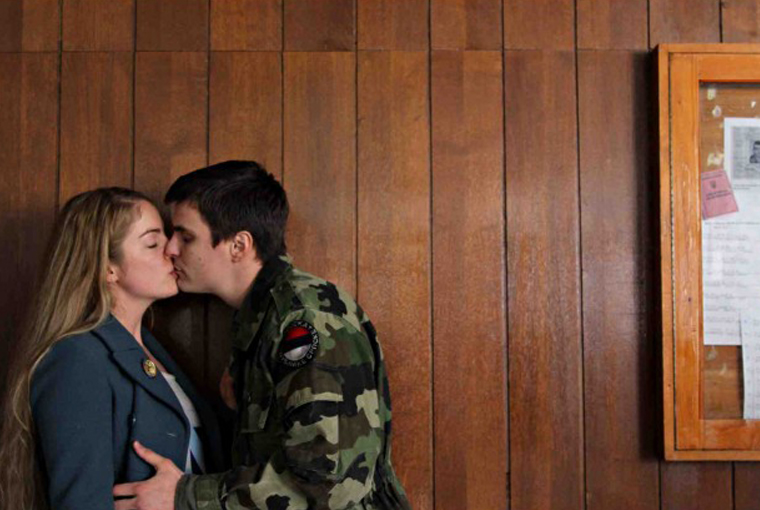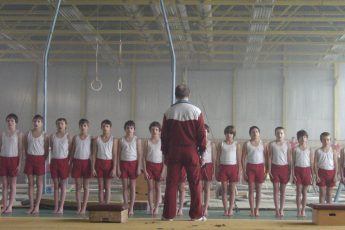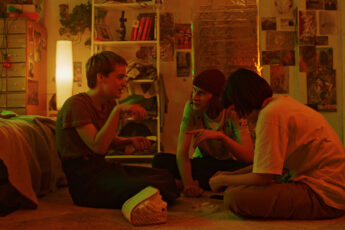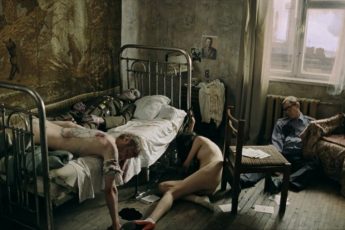
In January of 1993, a group of soldiers from the Army of the Republika Srpska (VRS) began harassing and beating an ethnic Bosniak at the market of Trebinje. Srdan Aleksic, also a VRS soldier, intervened to defend the victim, his neighbor and friend – and his fellow soldiers beat him to death.
In Serbia, Aleksic’s act has inspired a documentary on his life, an award in his name for heroism and inspiration, and a play. Srdan Golubović’s 2013 fiction film Circles is one more homage to add to the list. Yet instead of recreating the events leading to such a tragic killing as one might expect, Golubović explores the possible consequences of such an act of heroism/violence.
Marko (Vuk Kostic), our young hero, is only shown in the first few scenes of the film which occur in war-time Trebinje. He drinks a coffee with his father (Aleksandar Bercek), surprises his girlfriend (Hristina Popovic) at work, and walks to the town square with his friend Nebojsa (Nebojsa Glogovac), a doctor. The two friends playfully mime a game of basketball in an abandoned public playground and start a game of chess. This idyllic first passage – ironically, the only one that takes place during the war – is abruptly and mysteriously cut off as the film jumps twelve years into a darker future.
We then find the same characters spread across Europe, struggling to deal with social situations complicated by the aftermath of the war. Haris, a Muslim refugee, welcomes Marko’s girlfriend and young son to his home in Germany, agreeing to hide them from her violent ex-husband. In an anonymous Serbian city, Nebojsa recognizes a new patient, Todor (Boris Isakovic), as a war criminal and hesitates to perform life-saving surgery on him. Meanwhile, in Trebinje, Marko’s father debates employing a teenage boy whose father may have participated in Marko’s death.
The film artfully illustrates the questions and challenges of daily life once war is over. What role do you play when members of your family were the victims, or the killers, of people you see every day? How do you interact with those who killed – or saved – those you love?
The intersecting stories are played with poise by all of the actors, but Hristina Popovic stands out from the rest. Whereas the men lead settled – albeit tormented– lives after the war, Marko’s girlfriend’s life is destroyed. We learn that she has moved to Germany, where she worked in a club and had a child with the abusive club owner. She makes allusions to periods of depression and substance abuse, and her character is clearly not finished battling hopelessness. She seems to live in a constant, paralyzed state of fear that prevents her from completing even the most basic tasks. Her character is the most ambiguous: she refuses offers of entertainment, sends her child to bed in the middle of the day, and seems to spend the majority of her time crying.
Yet the question is not why she cannot seem to overcome the challenges before (and behind her), but how the other characters manage to do so. Unlike the emotional resolutions that seem to reconcile the other characters with their past, we last see Popovic on a bus, reluctantly returning to Trebinje, a city that she never wanted to return to. We do not know what reconciliations or conflicts await her, nor whether she will ever overcome the grief of losing Marko and gain the ability to positively raise her son.
This seems to be the most valuable of the film’s lessons, which otherwise attest to the human ability to “pass on” acts of self-sacrifice and forgive those who have done us wrong. The most valuable lesson is that in a world of senseless violence and senseless heroism, some things can be broken forever. The lives of the characters echo the life of a war-torn region. Martyrs can inspire heroism for those that they save, and hatred for those who killed them, but the loss of a life does more than inspire – it can also provoke grief whose results are unknown. Just as Popovic’s character confronts a city of her past wounded by the grief of the violence afflicted there and the fear of a challenging post-war life, Serbia confronts a future, not dictated by the heroism and violence of its past, but wounded.




Leave a Comment